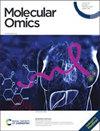更正:基于无标记策略的LC-MS/MS对诱导多能干细胞来源的大骨节病软骨细胞n -糖基化蛋白的分析
IF 3
4区 生物学
Q3 BIOCHEMISTRY & MOLECULAR BIOLOGY
引用次数: 0
摘要
修正了王森等人的“基于无标记策略的LC-MS/MS对诱导多能干细胞衍生的大骨节病软骨细胞n -糖基化蛋白的分析”,Mol. Omics, 2023, https://doi.org/10.1039/d3mo00018d。本文章由计算机程序翻译,如有差异,请以英文原文为准。
Correction: Analysis of N-glycosylation protein of Kashin–Beck disease chondrocytes derived from induced pluripotent stem cells based on label-free strategies with LC-MS/MS
Correction for ‘Analysis of N-glycosylation protein of Kashin–Beck disease chondrocytes derived from induced pluripotent stem cells based on label-free strategies with LC-MS/MS’ by Sen Wang et al., Mol. Omics, 2023, https://doi.org/10.1039/d3mo00018d.
求助全文
通过发布文献求助,成功后即可免费获取论文全文。
去求助
来源期刊

Molecular omics
Biochemistry, Genetics and Molecular Biology-Biochemistry
CiteScore
5.40
自引率
3.40%
发文量
91
期刊介绍:
Molecular Omics publishes high-quality research from across the -omics sciences.
Topics include, but are not limited to:
-omics studies to gain mechanistic insight into biological processes – for example, determining the mode of action of a drug or the basis of a particular phenotype, such as drought tolerance
-omics studies for clinical applications with validation, such as finding biomarkers for diagnostics or potential new drug targets
-omics studies looking at the sub-cellular make-up of cells – for example, the subcellular localisation of certain proteins or post-translational modifications or new imaging techniques
-studies presenting new methods and tools to support omics studies, including new spectroscopic/chromatographic techniques, chip-based/array technologies and new classification/data analysis techniques. New methods should be proven and demonstrate an advance in the field.
Molecular Omics only accepts articles of high importance and interest that provide significant new insight into important chemical or biological problems. This could be fundamental research that significantly increases understanding or research that demonstrates clear functional benefits.
Papers reporting new results that could be routinely predicted, do not show a significant improvement over known research, or are of interest only to the specialist in the area are not suitable for publication in Molecular Omics.
 求助内容:
求助内容: 应助结果提醒方式:
应助结果提醒方式:


